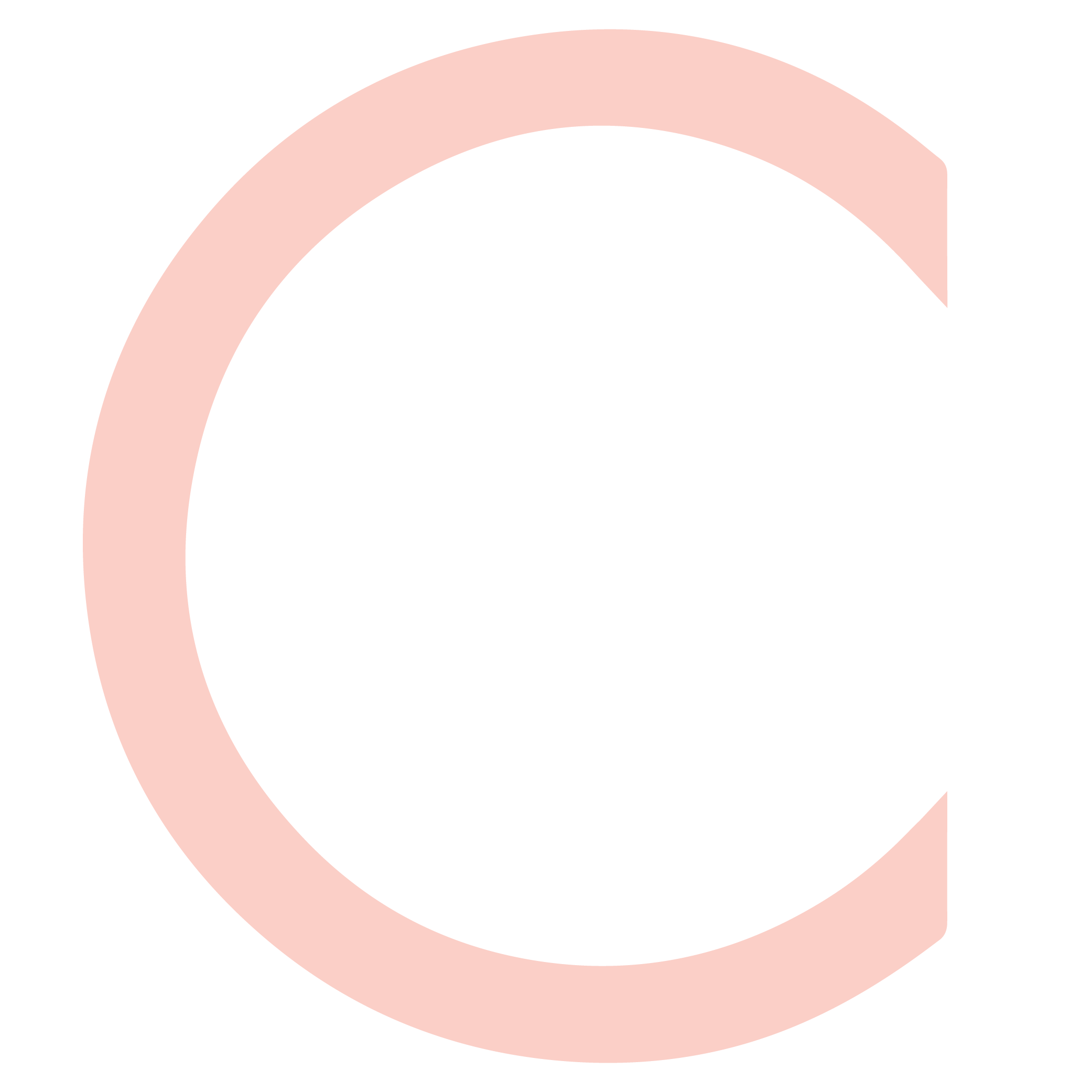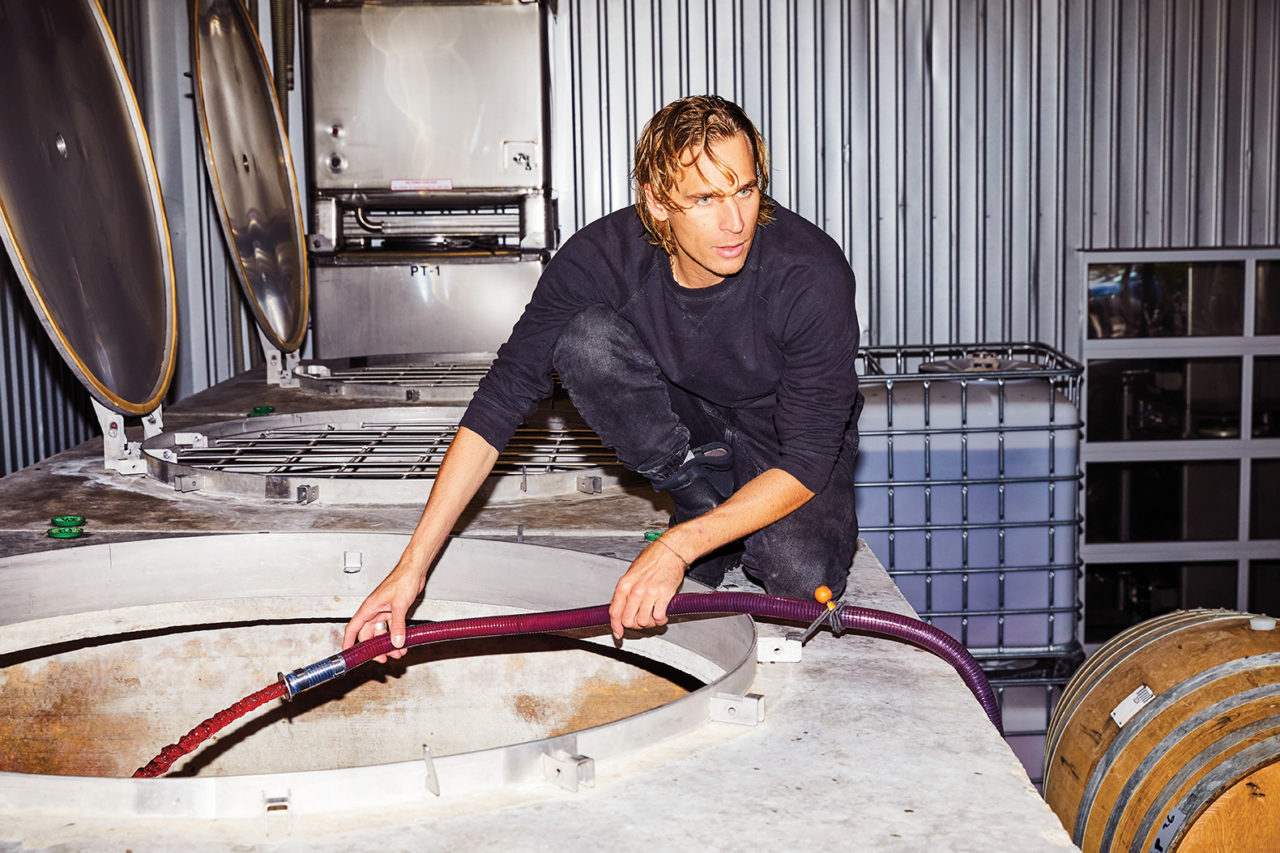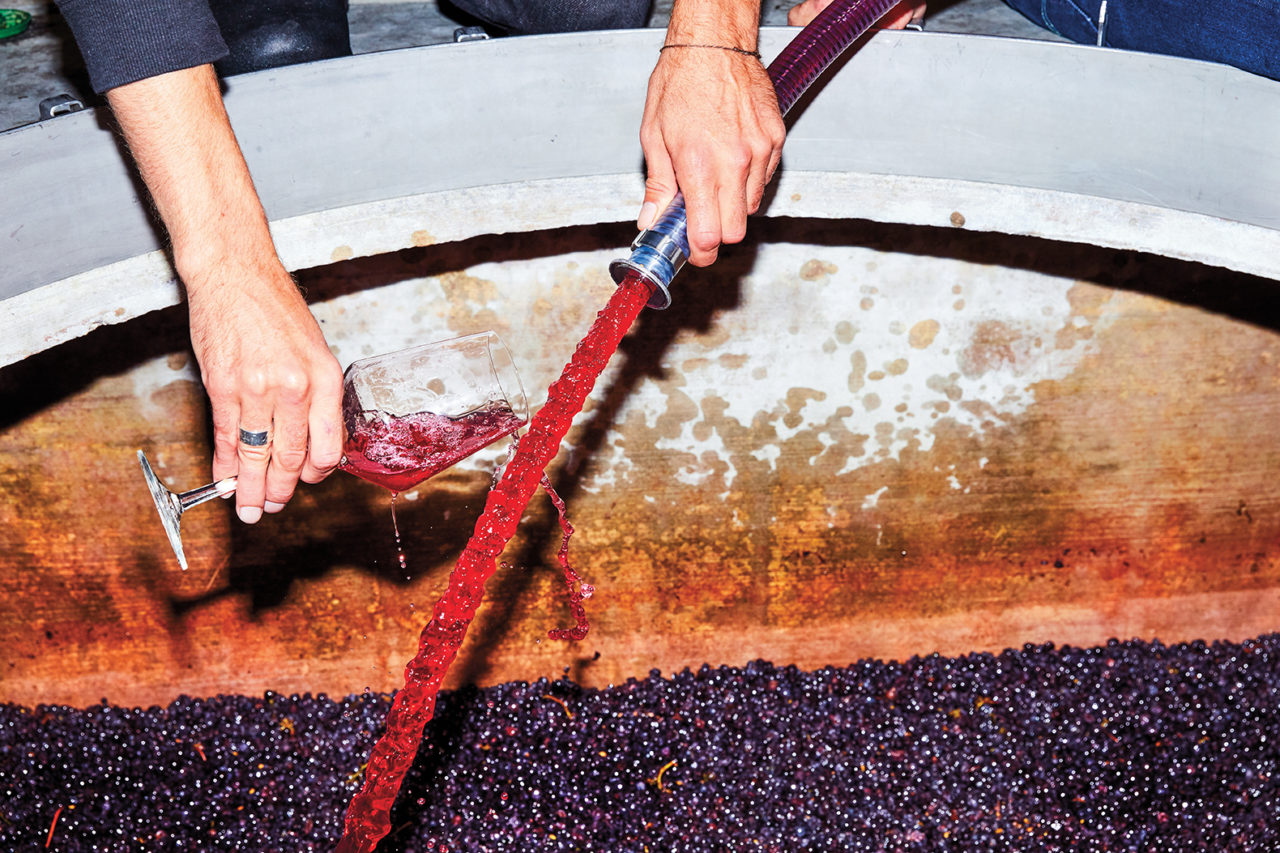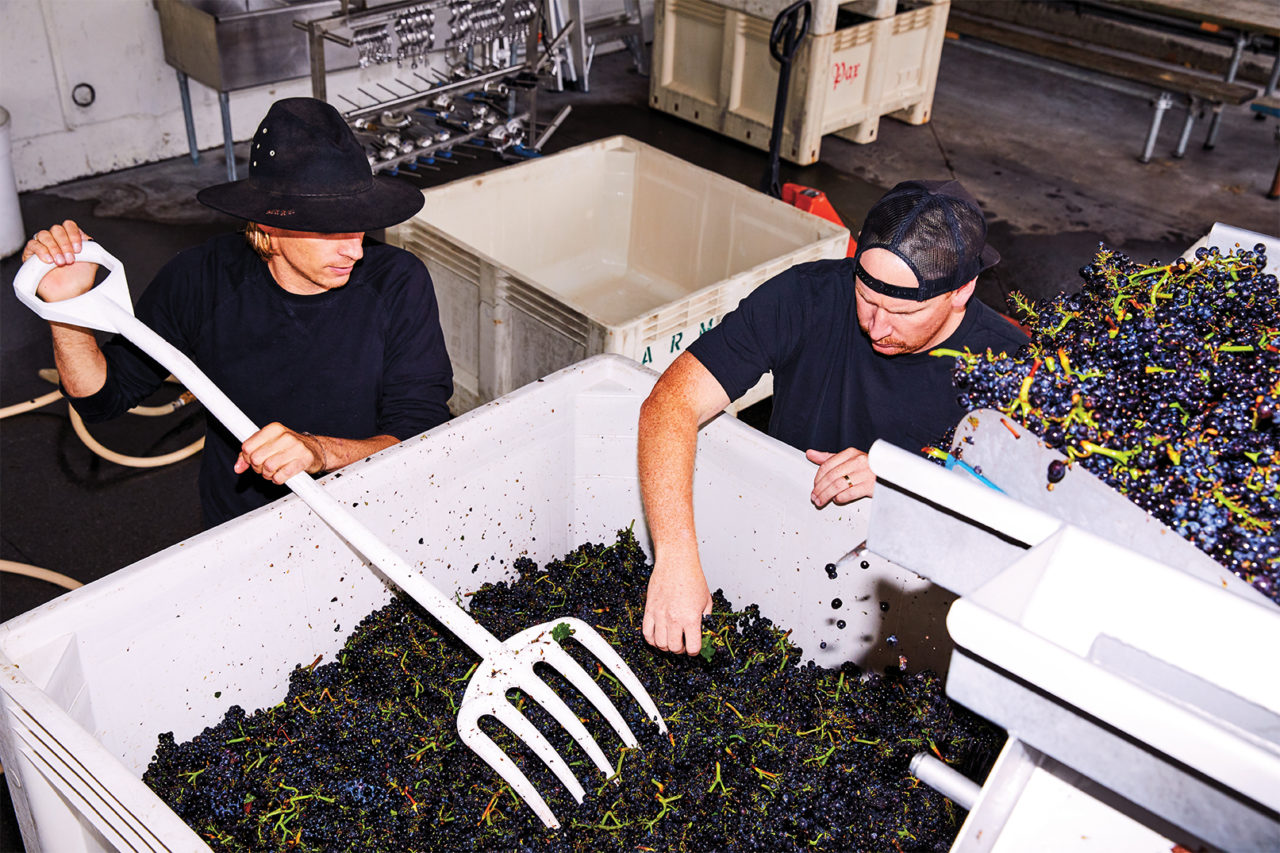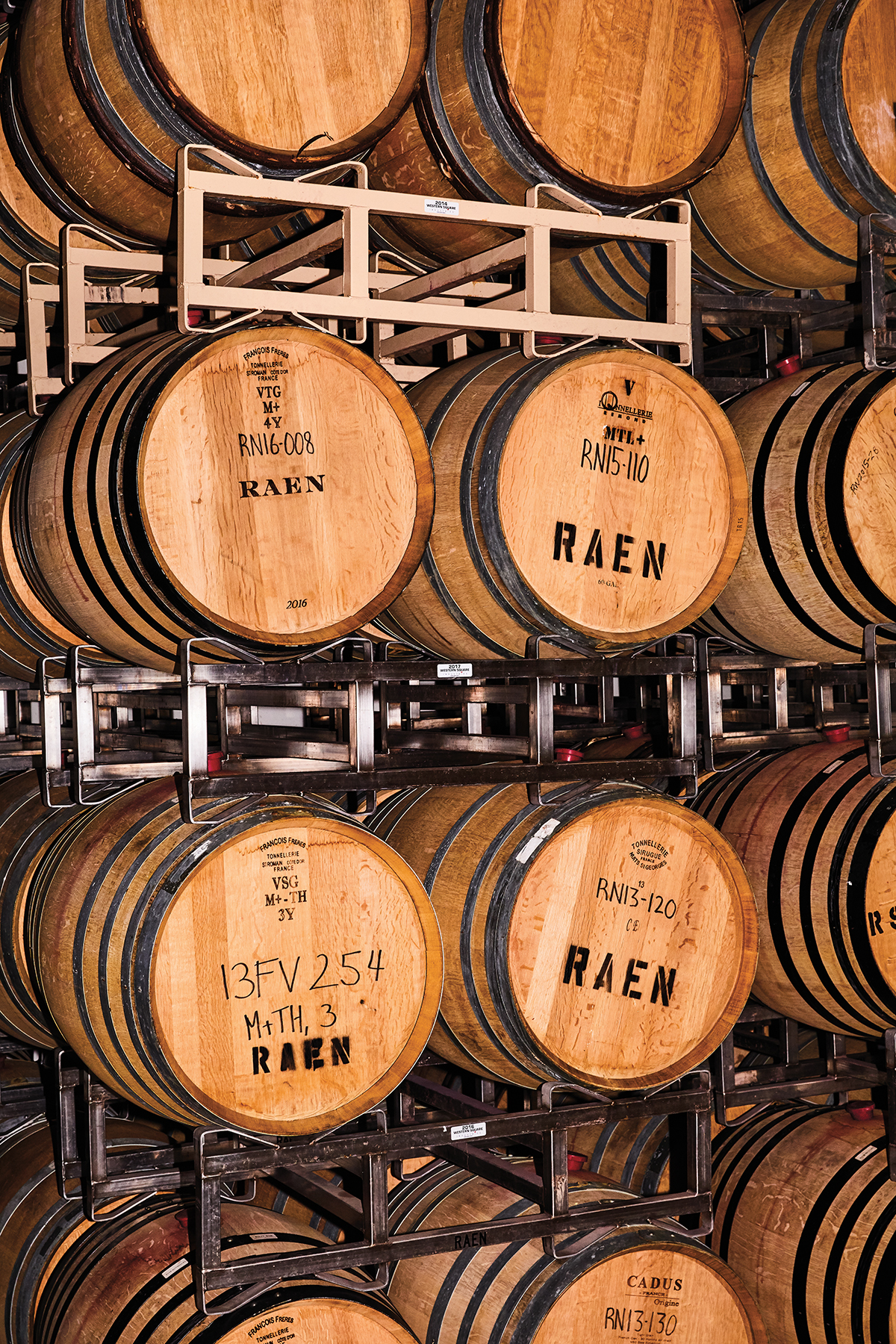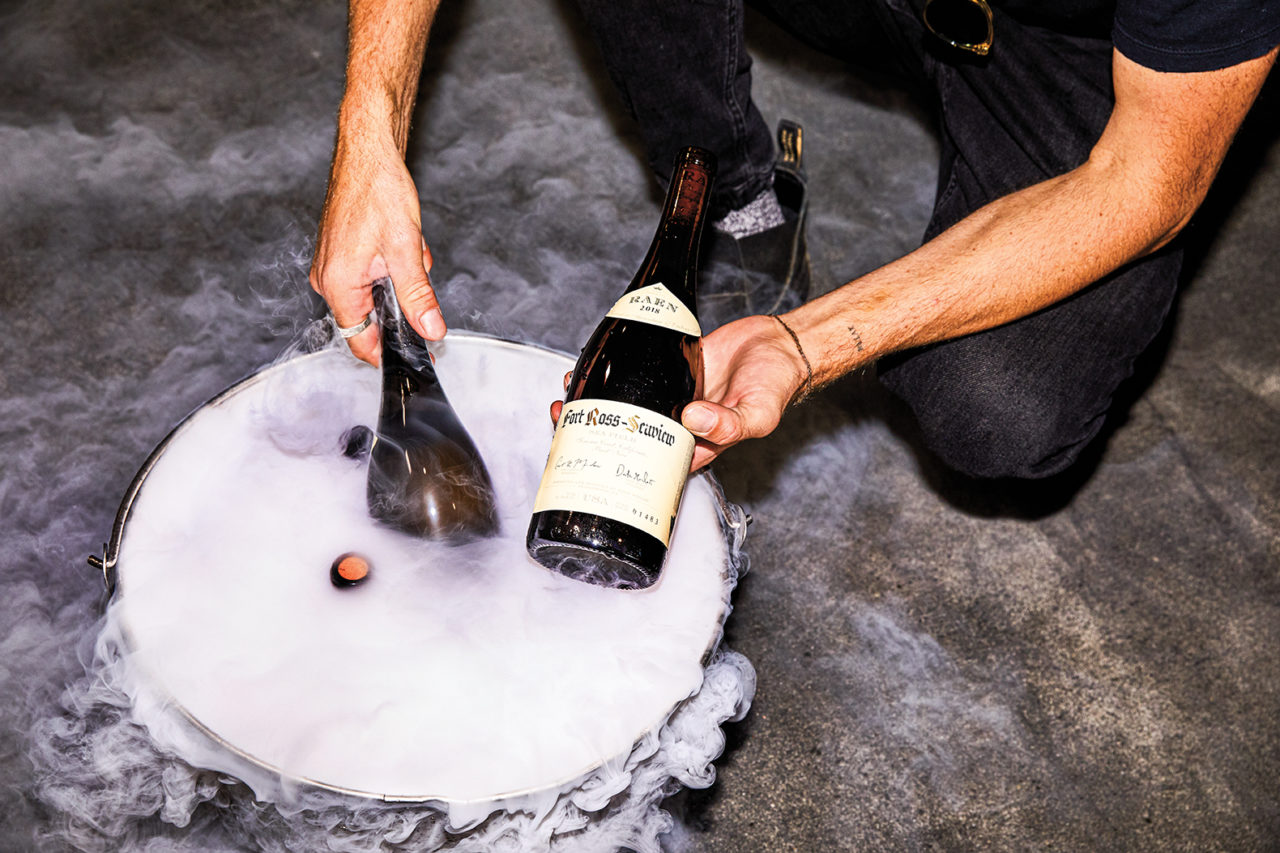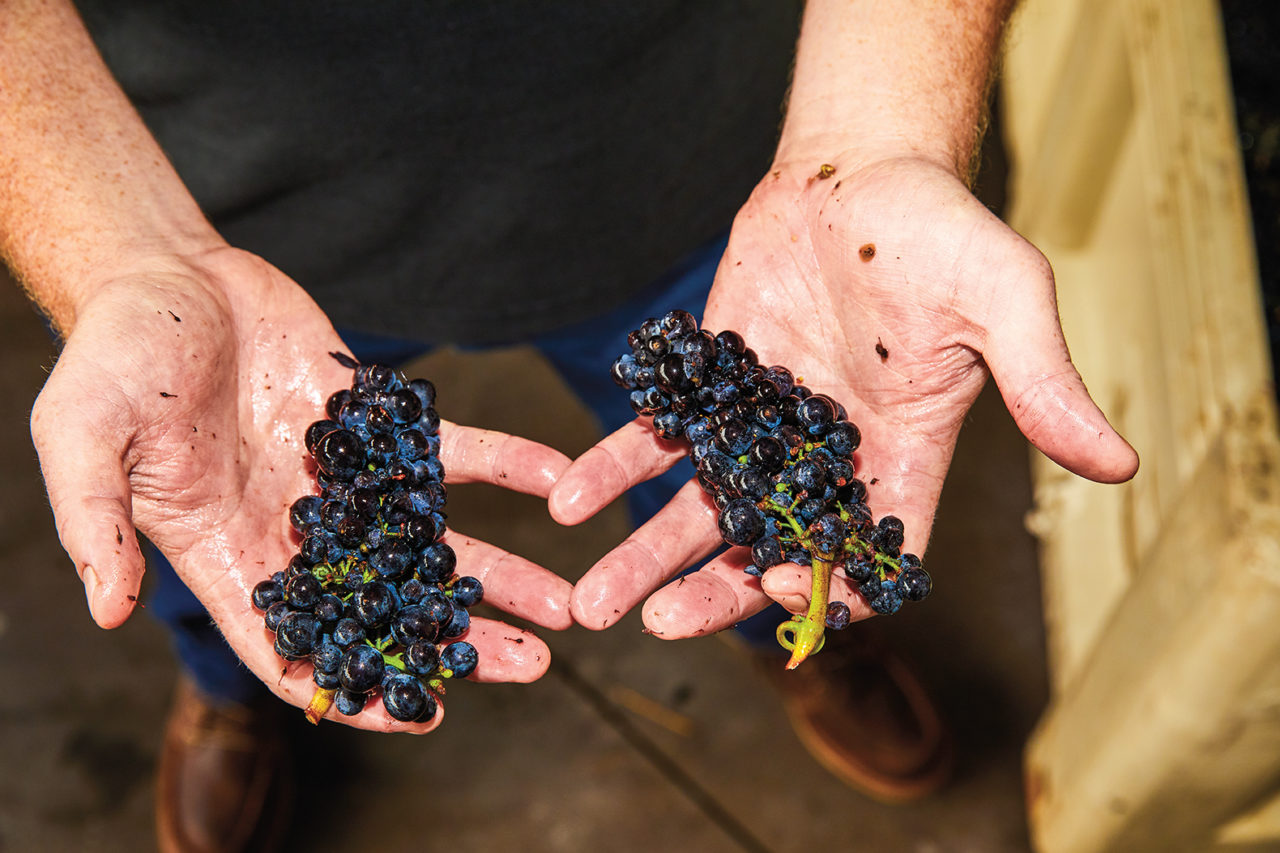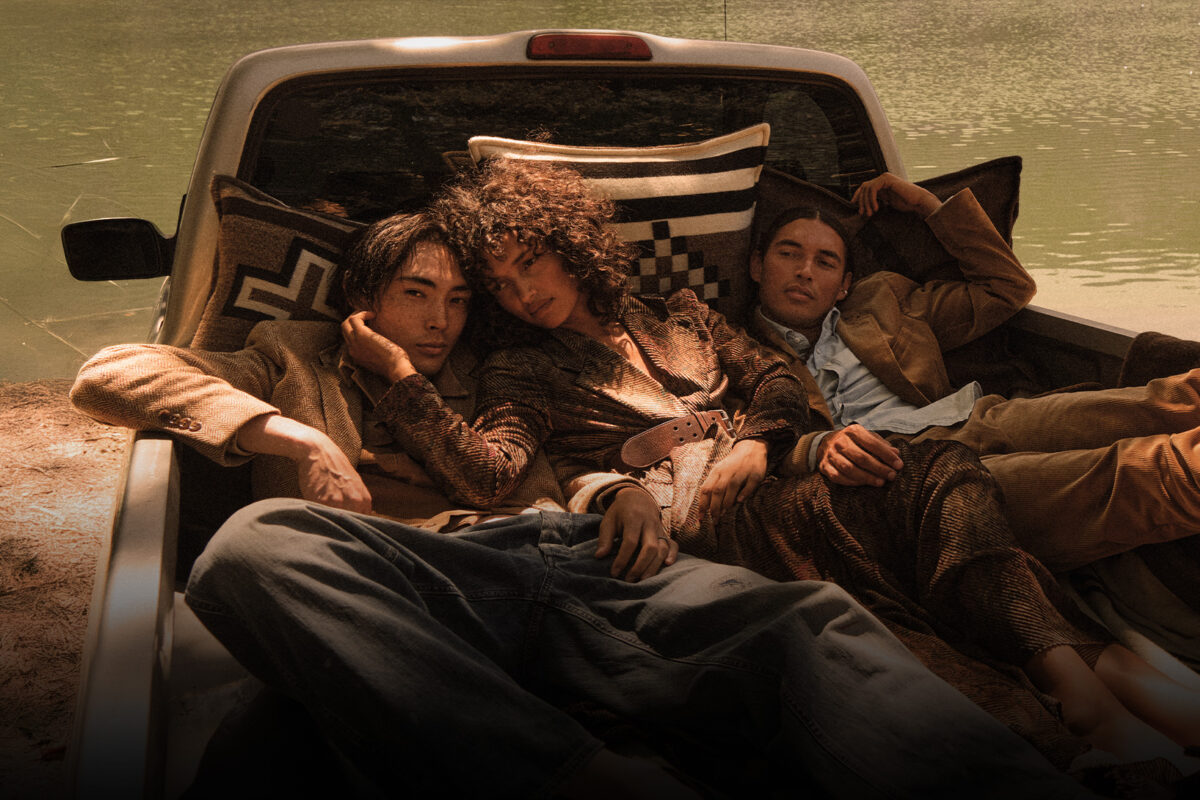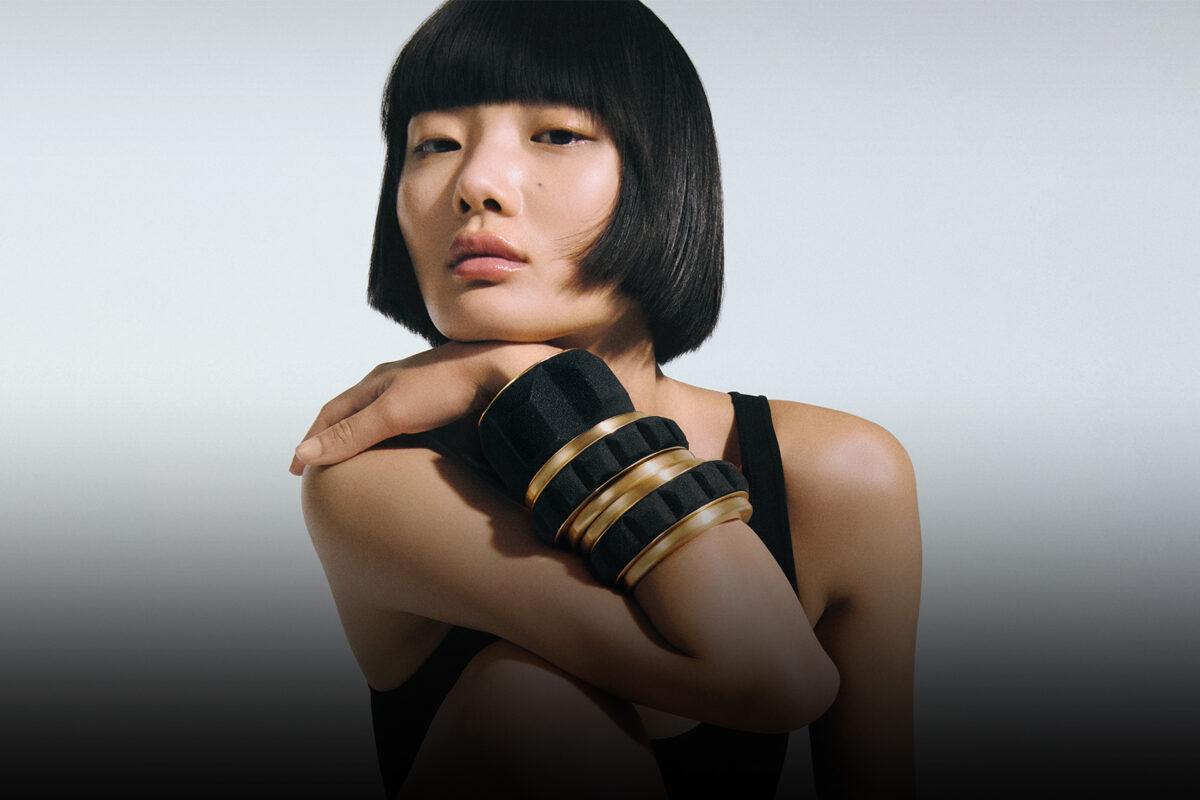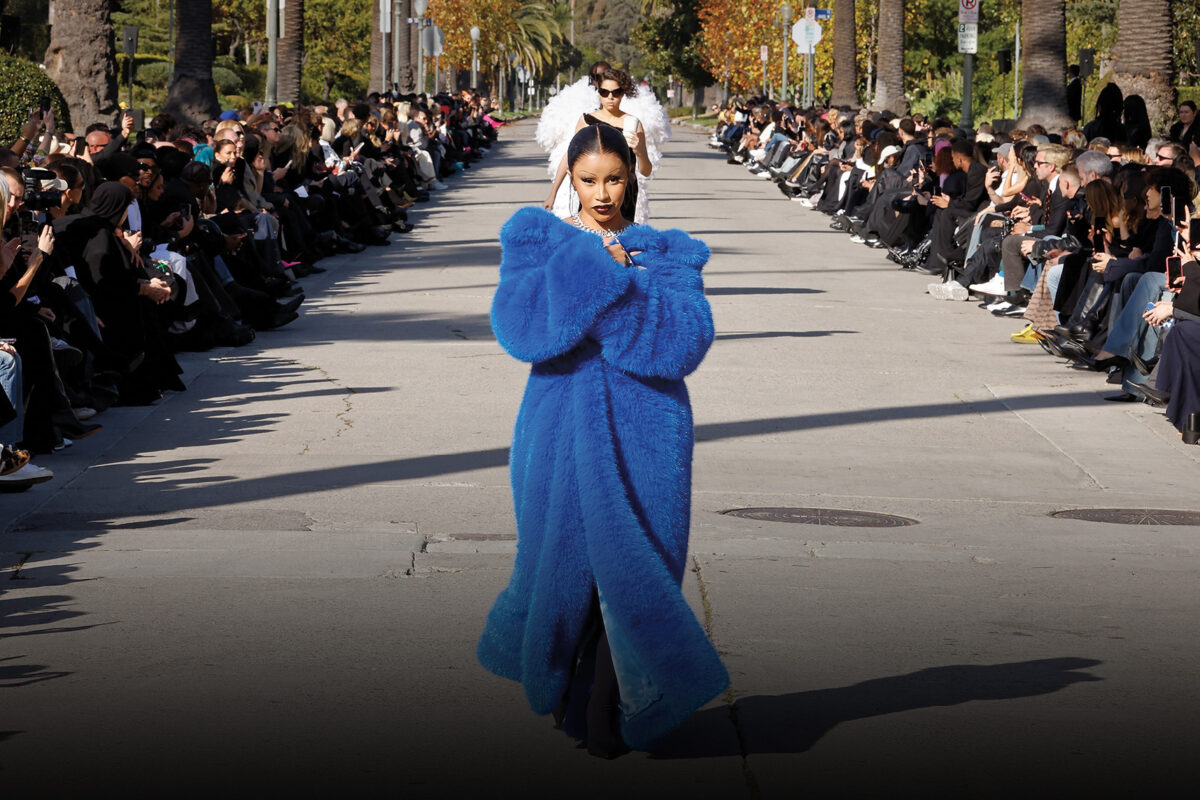Brothers Carlo and Dante have created a top-class natural pinot that is served at the finest restaurants on both coasts — how did they do it?
Words by JASON SHEELER
Photography by SAM FROST
Inside a former applesauce warehouse in the Barlow shopping district of Sebastopol, Carlo Mondavi sets down his coffee and reads a text message while dodging a forklift with a bumper sticker declaring “Corporate wines still suck.” “You gotta be careful with those, they can’t see you,” he says with a good-natured, yeah-bro accent, as another forklift backs up between us with gentle beeps.
Then he is off and the Aaron Sorkin-style “walk and talk” begins. “We had a good winter. The soil was replenished. The rivers were refilled.” Carlo pauses to dig through a barrel of grapes being rapidly filled by a conveyor belt. They’ve already been sorted twice, but he picks out a discolored bunch.
“The rosies,” Carlo says, tossing the under-ripened grapes into a bin a few feet away. “Those are what you call the sucky ones.” He sifts through the rest, happy with what he sees. Then he heads for a tarped container, pries back the cover, cups his hands and gently wafts the air toward his face.
“That is fermentation crashing.” He suggests taking a whiff. Just not too close, he cautions. “Sugar plus yeast yields alcohol. And gives off heat and CO2.” As he is explaining how people die every year during the harvest, by falling into the bins after breathing in the powerful fumes, I take a big inhale. First cherry, then black tea, and then … a bruised apple? Then lightheadedness. “That’s how people die. It’s like being choked.”
Reclining on a bench, he picks up his now-cold coffee and says, “We’re at 60 percent today, we’ll be done with the harvest in two days.” The pressure to succeed in this winemaking capital is intense — and that’s without taking into consideration his last name.
“The grapes hang longer and struggle to ripen, creating more tension and energy”
Dante Mondavi
Carlo, 39, is the grandson of the late Robert Mondavi, perhaps the most iconic figure in the history of Napa Valley winemaking. He and his brother Dante, 35, launched Raen in 2013 with the purpose of producing natural, world-class pinot noir on the Sonoma Coast. By all accounts, they’ve done it. Raen — an acronym for Research in Agriculture and Enology Naturally (and a wink at a favorite quote of their dad’s, “rain turns into wine”) — is now on the menu at some of the most lauded restaurants on both coasts, including Eleven Madison Park in New York and The French Laundry in Napa Valley. It retails for around $70 to $100 per bottle. Rajat Parr, a master sommelier and winemaker, praises the wine as “one of the best in America. And there are no absolutes in pinot noir.”
Dante, who is out on the road selling the wine during my visit and splits time between Raen and their father Tim Mondavi’s wine business (the much celebrated Continuum estate atop Napa’s Pritchard Hill), later describes the taste of Raen over the phone as “not overly jammy or plummy.” He credits the marine soil on the cool and wet Sonoma Coast, which makes for a longer growing season. “They hang longer. They struggle to ripen, creating more tension and energy in the wine,” he says.
This year’s production may be one of Raen’s biggest. (“About 3,000 cases, as opposed to 10 million at Robert Mondavi, which led to overgrowth,” Dante says.) The crop is from nearby vineyards, one of which is named Royal St. Robert (after their grandfather) about an hour away from the warehouse and a few miles from the coast.
It was, of course, Robert Mondavi who helped establish Napa Valley as we know it today. In fact, most in the wine world would agree that no one did more to promote the virtues of American wine. The son of an Italian immigrant grape exporter, Robert (or Bob as he was known among friends) established his winery near St. Helena in 1966 — after the start of a decades-long feud with his brother, Peter, who had his own success in wine — with the goal of creating American wines just as good as those in France. And he succeeded, building the family business to global conglomerate proportions. In the early 2000s, Robert Mondavi Winery — by then publicly traded, encompassing several brands of wine (both fine and cheap), with partners including the Walt Disney Company and the Rothschild family — was acquired by Constellation Brands in a $1 billion hostile takeover.
For a moment, Carlo and Dante (they have another brother and two sisters and all are in some way involved with the family business) appeared content to be scions. In 2009, they, along with their brother, Dominic, posed on a beach with half-full wine glasses for a Bruce Weber feature in Vanity Fair titled “Fortune’s Children.” It included assorted heirs and countesses, a lord, a princess and a Bloomingdale, along with Lapo Elkann and Ivanka Trump.
There were attempts at beer making. Carlo even snowboarded professionally and debuted Davi, a line of skincare products made from grapes. But creating the ultimate pinot nagged at Carlo and Dante. It’s what they both loved. In particular, a 2002 trip they took to Burgundy with their grandfather couldn’t be forgotten. Among other wineries, they visited Romanée-Conti. “He wanted to show us what he saw back in 1962 that gave him the inspiration to follow his dreams in wine,” Carlo says.
“Dad didn’t want confusion. We were forced to make our own relationships. Tough love”
Carlo Mondavi
After Continuum was up and running, Carlo and Dante decided to set off on their own. To be certain, Raen is entirely their undertaking. They even tried to rent space at their family’s Continuum estate. “We tried to use the cellar there, and we were told no. It’s very separate. My dad didn’t want to have any confusion. Turned out to be the best thing, as we were forced to make our own relationships and friendships.” He grinned. “Tough love.”
Chiara Mondavi, their artist sister who works at Continuum and is helping Carlo the day we meet, sighs while talking about the loss of the rights to the family name in the Constellation deal. But then smiles. “We got so big. Now, both with Continuum [which focuses on a single wine from a single estate] and with what Carlo and Dante are doing, we are able to go back and focus. And do everything a little bit slower. At a manageable level, and with family.” She points out the arrowhead tattoo on the inside of Carlo’s right arm, just above his elbow. It’s from an etching she made for Raen’s label, of an arrowhead she found in the vineyard. On the bottle it points down, as a declaration. On Carlo’s arm, it points forward.
Cliche as it might sound, the Mondavi ambition runs through Carlo and Dante’s veins as much as it does the wine. Carlo says he has a 100-year plan — apt, considering 2019 is the centennial of his great-grandfather Cesare Mondavi coming to California to source grapes. “We will have our own domain, our own winery all on [our own] property. That’s a $20 million investment. The banks just don’t trust us right now. We are having to work to get there.”The Mondavi name is as inescapable as it is legendary. And, as Parr laughs, it’s a little bit of baggage: “But people don’t just believe the name. They want to taste the wine.” And he notes their particularly nuanced process of extraction and slower fermentation. “It’s their style,” he says. He further notes that Carlo and Dante have engendered goodwill in the wine community. “They have been humble about it. Many people could have taken the pompous route. They are very careful. Their attitude is not, ‘We deserve it.’ They are more, ‘We are earning the right to make this wine.’”
Feature image: CARLO MONDAVI (left) and DANTE MONDAVI in the vineyard they named after their grandfather, the legendary winemaker ROBERT MONDAVI.
This story originally appeared in the Fall/Winter 2019 Men’s Edition of C Magazine.
Discover more FOOD news.
